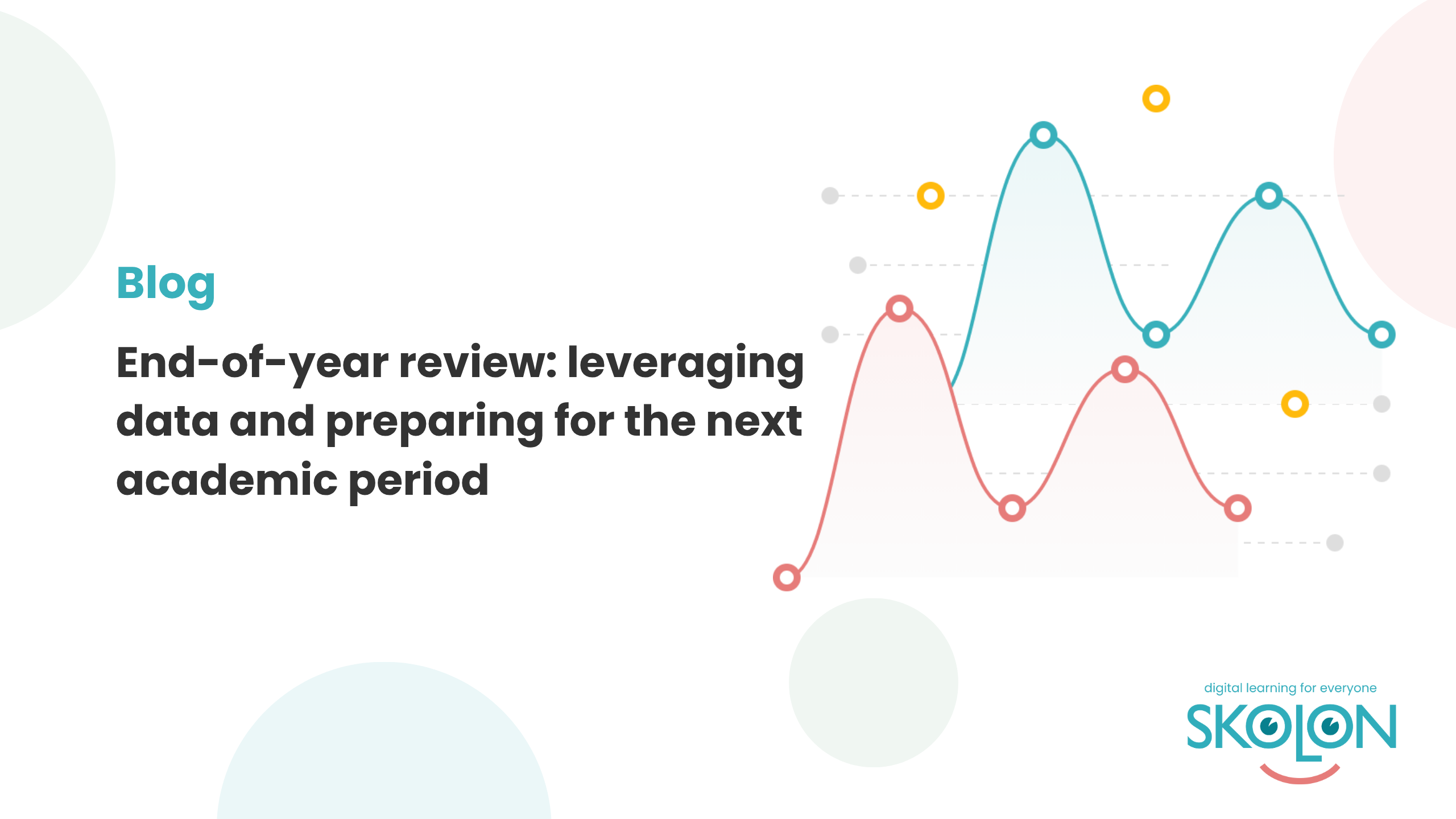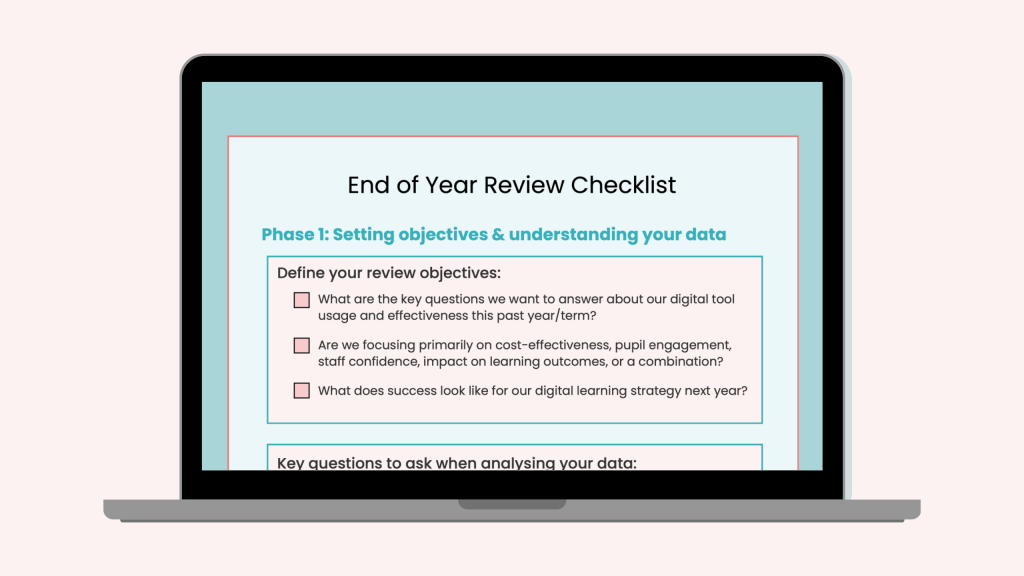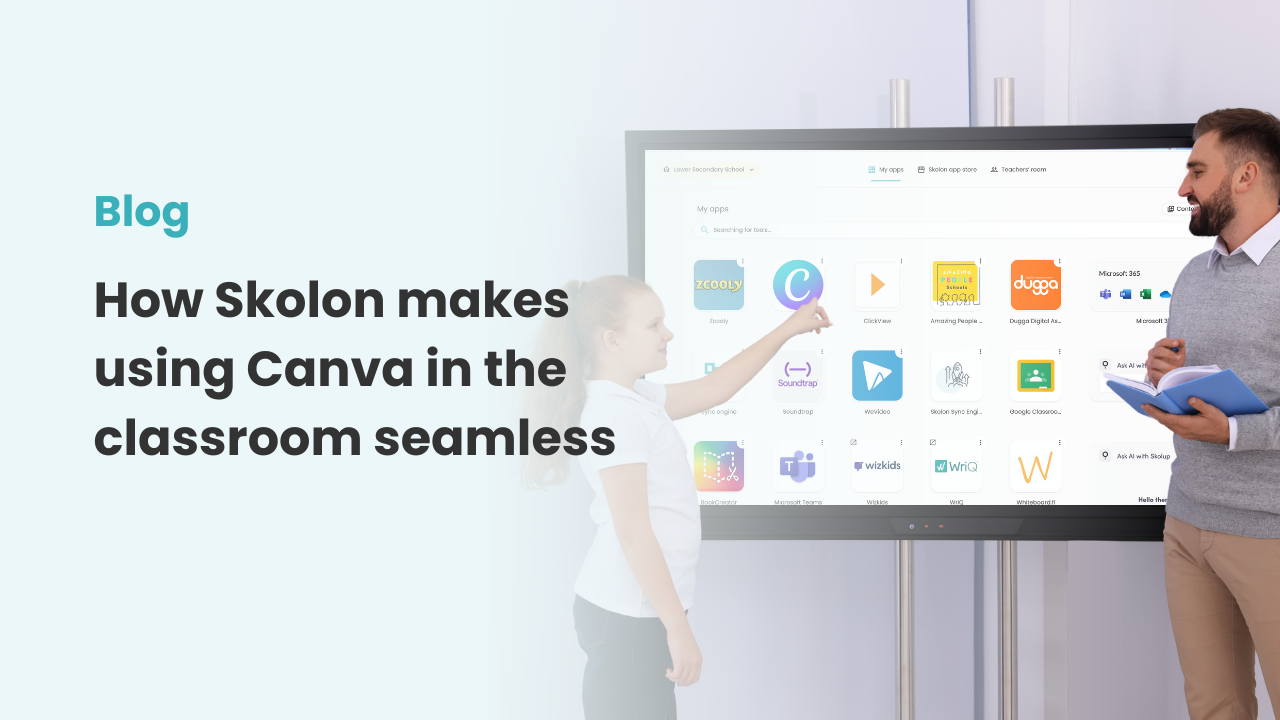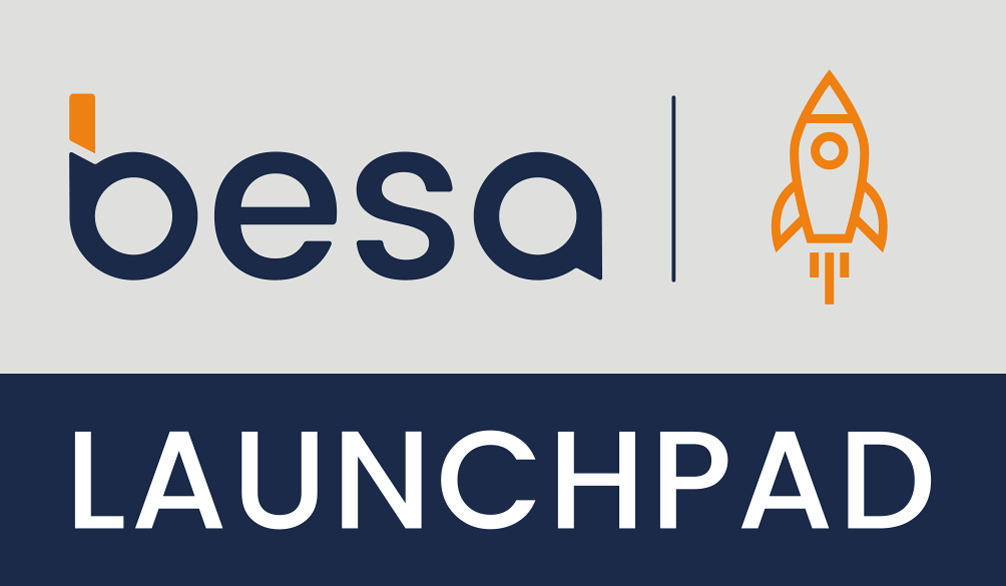End-of-year review: leveraging data and preparing for the next academic period


As the current academic year is in sight, school corridors across the UK are buzzing with activity. Alongside sports days and final assemblies, this period offers a crucial window for reflection and planning.
An effective end-of-year review, particularly one informed by solid data, can pave the way for a more impactful and efficient upcoming academic year. Data provides a rich seam of insights to mine, helping you understand past performance and strategically prepare for the future.
Why an end-of-term review matters for your school
Sometimes you have to step back to move forward and that’s the case when it comes to assessing the effectiveness of your digital learning strategies and resource deployment. A thorough review allows your school or trust to:
- Identify successes and build on them: Understand which digital tools and approaches have genuinely enhanced teaching and learning for your pupils.
- Pinpoint areas for development: Uncover challenges, whether they relate to underused resources, training needs, or equitable access.
- Make informed strategic decisions: Base choices about future investments, resource allocation, and pedagogical strategies on evidence rather than assumptions.
- Enhance teaching and learning outcomes: Ultimately, a well-informed review contributes to a better educational experience for all pupils. Research consistently underscores the benefits of data-informed decision-making in improving educational outcomes.
Unlocking insights with your data
We all know data is powerful, yet we don’t appreciate exactly how powerful it is. Data allows you to move beyond anecdotes and gain a clearer, evidence-based understanding of your digital landscape.
By analysing these metrics, your school can begin to see which digital resources are truly resonating with staff and pupils, whether there’s equitable access to crucial tools, and if investments in certain platforms are yielding the desired engagement. To help you delve deeper and ask the right questions of your data, we’ve developed a comprehensive checklist, downloadable for FREE at the bottom of the blog.

Using data to shape your strategy for the new academic year
The insights gleaned from your data review should directly inform your planning for September and beyond:
- Informed resource management and budgeting: Make evidence-based decisions on renewing software subscriptions. If a costly tool shows minimal engagement despite support, it might be time to reconsider that investment or explore alternatives.
- Curriculum and pedagogical planning: Understand which digital resources are proving most effective in supporting different subject areas or pedagogical approaches.
- Supporting pupil engagement and digital equity: Analyse usage patterns to ensure that all pupils, including those with special educational needs and disabilities (SEND) or those eligible for pupil premium, have equitable access to and are benefiting from your digital learning provision.
- Streamlining access and user management: Reviewing how Single Sign-On (SSO) and automated account provisioning are working can help identify any hitches, ensuring pupils and staff can seamlessly access the tools they need from day one of the new term.
Your practical guide to the end-of-year review
Conducting a meaningful end-of-year review requires a structured approach. It’s about asking the right questions, involving the right people, and translating findings into concrete actions.
To support you in this process, we’ve created a Downloadable End-of-Year Review Checklist. This practical resource provides a step-by-step guide, including key questions to consider when analysing your data, defining your objectives, gathering broader feedback, and formulating your action plan for the next academic period.
Unlocking insights with your data
We all know data is powerful, yet we don’t appreciate exactly how powerful it is. Data allows you to move beyond anecdotes and gain a clearer, evidence-based understanding of your digital landscape.
By analysing these metrics, your school can begin to see which digital resources are truly resonating with staff and pupils, whether there’s equitable access to crucial tools, and if investments in certain platforms are yielding the desired engagement. To help you delve deeper and ask the right questions of your data, we’ve developed a comprehensive checklist, downloadable for FREE by clicking here, or using the button above.
This checklist will guide you through:
- Setting clear goals for your digital strategy review.
- Effectively gathering and interpreting your usage data.
- Combining quantitative data with valuable qualitative feedback from your school community.
- Facilitating productive discussions with relevant teams.
- Developing and documenting actionable steps to enhance your digital learning environment.
Looking ahead: fostering a culture of continuous improvement
The end-of-year review isn’t just a once-a-year task; it’s a vital part of an ongoing cycle of improvement. The insights gained now will set a stronger foundation for the new academic year, but the principles of monitoring usage, gathering feedback, and adapting your approach should continue.
If your data isn’t good enough to conduct a proper, in-depth and productive review, then you need to take action.
Chat with us using the button below to find out more about how Skolon has been designed to support this journey by providing ongoing access to usage data, simplifying resource management, and ensuring easy access for all users.
By regularly engaging with this data, supported by resources like our new checklist, and fostering a reflective culture within your school or trust, you can ensure your digital learning environment continually evolves to meet the needs of your pupils and staff, ultimately enhancing educational outcomes for everyone.
This is Skolon – we gather the best digital educational tools and make them work in the classroom.
Skolon is an independent platform for digital educational tools and learning resources, created for both teachers and students. With Skolon, accessing and using your digital educational tools is easy – security increases, administration decreases, and there’s more time for learning.
The digital educational tools come from both small and large providers, all of whom have one thing in common – they create digital educational tools that are beneficial for the school environment.
Information
Share this story
Subscribe
Would you like our newest articles delivered to your inbox? Sign up now!
As the current academic year is in sight, school corridors across the UK are buzzing with activity. Alongside sports days and final assemblies, this period offers a crucial window for reflection and planning.
An effective end-of-year review, particularly one informed by solid data, can pave the way for a more impactful and efficient upcoming academic year. Data provides a rich seam of insights to mine, helping you understand past performance and strategically prepare for the future.
Why an end-of-term review matters for your school
Sometimes you have to step back to move forward and that’s the case when it comes to assessing the effectiveness of your digital learning strategies and resource deployment. A thorough review allows your school or trust to:
- Identify successes and build on them: Understand which digital tools and approaches have genuinely enhanced teaching and learning for your pupils.
- Pinpoint areas for development: Uncover challenges, whether they relate to underused resources, training needs, or equitable access.
- Make informed strategic decisions: Base choices about future investments, resource allocation, and pedagogical strategies on evidence rather than assumptions.
- Enhance teaching and learning outcomes: Ultimately, a well-informed review contributes to a better educational experience for all pupils. Research consistently underscores the benefits of data-informed decision-making in improving educational outcomes.
Unlocking insights with your data
We all know data is powerful, yet we don’t appreciate exactly how powerful it is. Data allows you to move beyond anecdotes and gain a clearer, evidence-based understanding of your digital landscape.
By analysing these metrics, your school can begin to see which digital resources are truly resonating with staff and pupils, whether there’s equitable access to crucial tools, and if investments in certain platforms are yielding the desired engagement. To help you delve deeper and ask the right questions of your data, we’ve developed a comprehensive checklist, downloadable for FREE at the bottom of the blog.

Using data to shape your strategy for the new academic year
The insights gleaned from your data review should directly inform your planning for September and beyond:
- Informed resource management and budgeting: Make evidence-based decisions on renewing software subscriptions. If a costly tool shows minimal engagement despite support, it might be time to reconsider that investment or explore alternatives.
- Curriculum and pedagogical planning: Understand which digital resources are proving most effective in supporting different subject areas or pedagogical approaches.
- Supporting pupil engagement and digital equity: Analyse usage patterns to ensure that all pupils, including those with special educational needs and disabilities (SEND) or those eligible for pupil premium, have equitable access to and are benefiting from your digital learning provision.
- Streamlining access and user management: Reviewing how Single Sign-On (SSO) and automated account provisioning are working can help identify any hitches, ensuring pupils and staff can seamlessly access the tools they need from day one of the new term.
Your practical guide to the end-of-year review
Conducting a meaningful end-of-year review requires a structured approach. It’s about asking the right questions, involving the right people, and translating findings into concrete actions.
To support you in this process, we’ve created a Downloadable End-of-Year Review Checklist. This practical resource provides a step-by-step guide, including key questions to consider when analysing your data, defining your objectives, gathering broader feedback, and formulating your action plan for the next academic period.
Unlocking insights with your data
We all know data is powerful, yet we don’t appreciate exactly how powerful it is. Data allows you to move beyond anecdotes and gain a clearer, evidence-based understanding of your digital landscape.
By analysing these metrics, your school can begin to see which digital resources are truly resonating with staff and pupils, whether there’s equitable access to crucial tools, and if investments in certain platforms are yielding the desired engagement. To help you delve deeper and ask the right questions of your data, we’ve developed a comprehensive checklist, downloadable for FREE by clicking here, or using the button above.
This checklist will guide you through:
- Setting clear goals for your digital strategy review.
- Effectively gathering and interpreting your usage data.
- Combining quantitative data with valuable qualitative feedback from your school community.
- Facilitating productive discussions with relevant teams.
- Developing and documenting actionable steps to enhance your digital learning environment.
Looking ahead: fostering a culture of continuous improvement
The end-of-year review isn’t just a once-a-year task; it’s a vital part of an ongoing cycle of improvement. The insights gained now will set a stronger foundation for the new academic year, but the principles of monitoring usage, gathering feedback, and adapting your approach should continue.
If your data isn’t good enough to conduct a proper, in-depth and productive review, then you need to take action.
Chat with us using the button below to find out more about how Skolon has been designed to support this journey by providing ongoing access to usage data, simplifying resource management, and ensuring easy access for all users.
By regularly engaging with this data, supported by resources like our new checklist, and fostering a reflective culture within your school or trust, you can ensure your digital learning environment continually evolves to meet the needs of your pupils and staff, ultimately enhancing educational outcomes for everyone.
This is Skolon – we gather the best digital educational tools and make them work in the classroom.
Skolon is an independent platform for digital educational tools and learning resources, created for both teachers and students. With Skolon, accessing and using your digital educational tools is easy – security increases, administration decreases, and there’s more time for learning.
The digital educational tools come from both small and large providers, all of whom have one thing in common – they create digital educational tools that are beneficial for the school environment.
Share this story
Subscribe
Would you like our newest articles delivered to your inbox? Sign up now!



